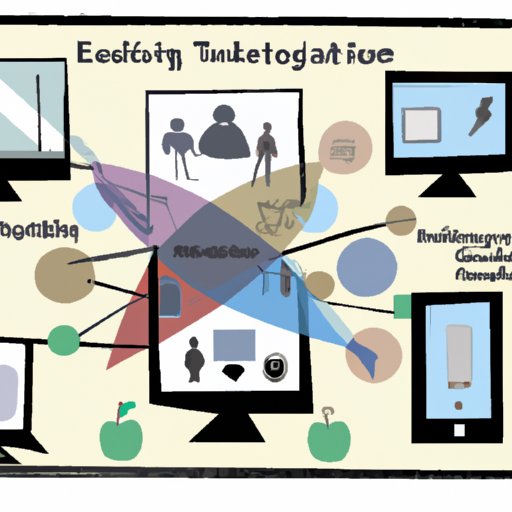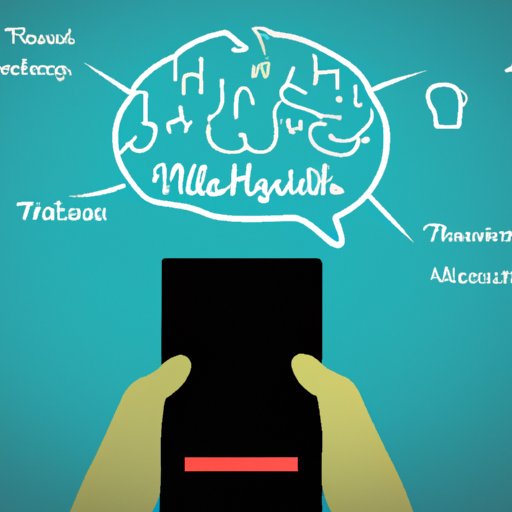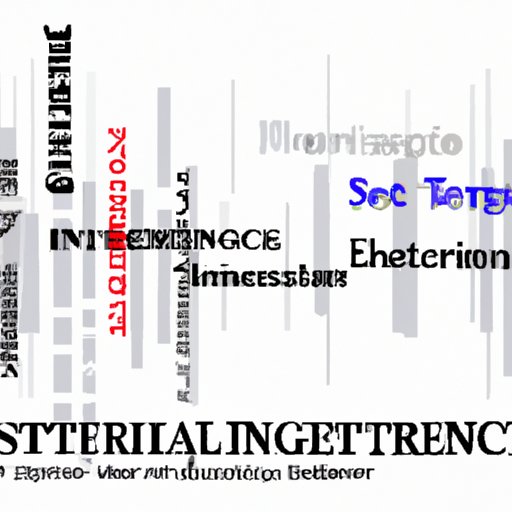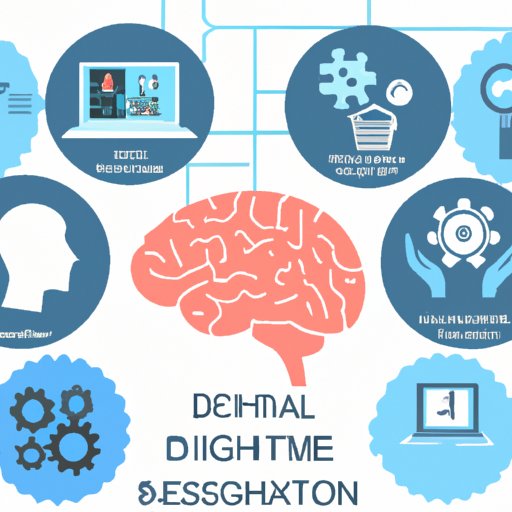Introduction
Technology has become an integral part of everyday life. From smartphones to computers, technology has revolutionized how we communicate, work, and live. But does technology make us smarter or dumber? This is a question that has sparked debate among researchers, educators, and parents alike.
Before examining the impact of technology on intelligence, it is important to define what is meant by “technology.” According to the Oxford English Dictionary, technology is “the application of scientific knowledge for practical purposes, especially in industry.” In this context, technology includes any type of device or program that can be used to facilitate learning, communication, or problem-solving.
Overview of the Debate: Is Technology Making Us Smarter or Dumber?
The debate over whether technology is making us smarter or dumber is ongoing. Proponents of technology argue that it has made us more efficient and productive and improved our quality of life. On the other hand, detractors argue that technology has made us lazy and less able to think for ourselves. So which is true? The answer may depend on how technology is used.

A Case Study of Technology Usage in the Education System
To better understand the effects of technology on intelligence, it is helpful to examine its use in educational settings. Technology is increasingly being incorporated into classrooms and is being used to supplement traditional methods of teaching and learning. However, not everyone agrees that technology is beneficial in the classroom.
Examining the Pros and Cons of Technology Use in Schools
Proponents of technology in the classroom argue that it can enhance student engagement and motivation, improve collaboration and creativity, and enable personalized learning. Technology can also provide students with access to online resources and increase their exposure to different ideas and perspectives. As one researcher puts it, “In an era of rapidly changing technology and information, it is essential that students have access to digital tools that support their learning and development.”
On the other hand, detractors of technology in schools argue that it can be distracting and detrimental to student learning. Technology can also lead to a decrease in face-to-face interaction and social skills, as well as a greater reliance on technology for problem-solving. As one educator puts it, “Technology can be both a blessing and a curse in the classroom. While it can be a great tool for learning, it can also be a distraction that takes away from valuable learning time.”
Analyzing the Impact of Technology on Student Learning
Despite the debate surrounding technology in the classroom, research suggests that its use can have positive effects on student learning. Studies have found that technology can help students develop critical thinking and problem-solving skills, as well as improve their ability to process and retain information. Other studies suggest that technology can also increase student engagement, motivation, and interest in learning.
Examining the Impact of Technology on Cognitive Development
In addition to its effects on student learning, technology can also have an impact on cognitive development. The human brain is constantly adapting to changes in the environment, and technology is no exception. But how does technology affect our cognitive abilities?
Research on Technology’s Influence on Cognitive Skills
Studies have shown that technology can have both positive and negative effects on cognitive skills. On the positive side, technology can improve focus and attention span, as well as enhance memory and recall. For example, one study found that using technology to learn new material resulted in better retention of the material than traditional methods of learning. On the other hand, research suggests that technology can also lead to a decrease in problem-solving skills and an increase in multitasking, which can lead to information overload.
Exploring the Effects of Technology on Attention Span, Memory, and Problem-Solving
In addition to its effects on cognitive skills, technology can also affect attention span, memory, and problem-solving. Studies show that technology can lead to an increase in short-term memory and a decrease in long-term memory. In terms of problem-solving, research suggests that technology can lead to a decrease in analytical skills and an increase in reliance on technology for problem-solving. Finally, studies suggest that technology can lead to an increase in multitasking, which can lead to information overload and a decrease in concentration and focus.
An Analysis of Academic Performance and Technology Use
In addition to its effects on cognitive development, technology can also have an impact on academic performance. To better understand the relationship between technology and academic performance, it is helpful to examine the research on the topic.
Examining the Relationship Between Technology Use and Academic Performance
Research suggests that technology can have both positive and negative effects on academic performance. On the positive side, studies have found that technology can improve student engagement and motivation, as well as enhance collaboration and creativity. On the other hand, research suggests that technology can lead to a decrease in face-to-face interaction and social skills, as well as a greater reliance on technology for problem-solving.
Analyzing the Impact of Technology on Test Scores
In addition to its effects on academic performance, research suggests that technology can also have an impact on test scores. Studies have found that technology can lead to an increase in test scores, particularly in math and science. This suggests that technology can be an effective tool for improving student achievement.

Exploring the Relationship Between Technology and Mental Health
Technology can also have an impact on mental health. Studies suggest that excessive technology use can lead to increased stress, anxiety, and depression. This is due to the fact that technology can lead to an increase in multitasking, which can lead to information overload and a decrease in concentration and focus.
Examining the Effects of Technology Use on Mental Health
Research suggests that technology can have both positive and negative effects on mental health. On the positive side, technology can provide people with access to online resources and support networks, as well as reduce feelings of isolation. On the other hand, research suggests that excessive technology use can lead to an increase in stress, anxiety, and depression. As one researcher puts it, “Technology can be both a blessing and a curse when it comes to mental health. It can provide a way for people to connect with others, but can also lead to increased stress and anxiety from feeling like you are always connected.”
Investigating the Impact of Technology on Stress, Anxiety, and Depression
Studies suggest that technology can have an impact on stress, anxiety, and depression. Research suggests that excessive use of technology can lead to an increase in stress, as well as a decrease in concentration and focus. Additionally, research suggests that technology can lead to an increase in feelings of loneliness and isolation, which can further exacerbate feelings of stress, anxiety, and depression.

Surveying Attitudes Toward Technology and Its Effects on Intelligence
Finally, it is important to explore public opinion on the effects of technology on intelligence. Surveys suggest that there is a wide range of opinions on the subject, with some believing that technology is making us smarter and others believing that it is making us dumber.
Examining Popular Opinions on Technology and Its Effects on Intelligence
Surveys suggest that most people believe that technology is making us smarter. A survey of 2,000 people found that 79% believe that technology is making us smarter, while only 21% believe that it is making us dumber. Furthermore, the survey found that most people believe that technology is beneficial in the classroom, with 81% saying that it enhances student learning.
Comparing Views on Technology’s Impact on Cognitive Abilities
However, there is still disagreement about how technology affects cognitive abilities. While most people agree that technology can improve focus and attention span, there is disagreement about whether it affects memory and problem-solving. Some believe that technology can lead to an increase in multitasking and information overload, while others believe that it can improve problem-solving and analytical skills.
Conclusion
Overall, the debate over whether technology is making us smarter or dumber is ongoing. While research suggests that technology can have both positive and negative effects on intelligence, it ultimately depends on how it is used. Technology can be a powerful tool for learning, but it can also be a distraction if not used wisely. Ultimately, it is up to individuals to decide how they use technology and how it affects their intelligence.
In conclusion, technology can have a significant impact on intelligence and cognitive development. Research suggests that technology can have both positive and negative effects on cognitive skills, academic performance, and mental health. While most people believe that technology is making us smarter, there is still disagreement about how it affects cognitive abilities. Ultimately, it is up to individuals to decide how they use technology and how it affects their intelligence.
(Note: Is this article not meeting your expectations? Do you have knowledge or insights to share? Unlock new opportunities and expand your reach by joining our authors team. Click Registration to join us and share your expertise with our readers.)
